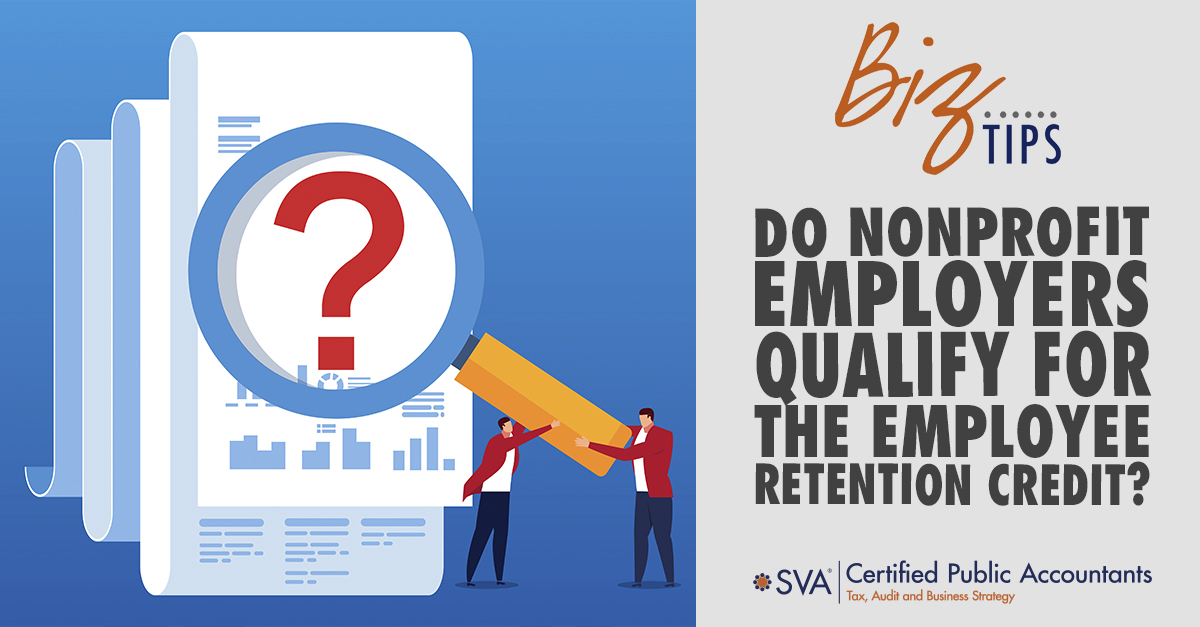The Coronavirus Aid, Relief and Economic Security (CARES) Act was passed by the United States Congress on March 27, 2020. This economic stimulus bill was created in an effort to help American taxpayers who suffered economically from the fallout as a result of the coronavirus pandemic.
The CARES Act legislation included a provision for small businesses, including nonprofit organizations, to receive employee retention credits to help ease the entity’s payroll tax burden and to help mitigate the negative impact of the pandemic on the organization’s activities.
What Are Employee Retention Credits?
The Employee Retention Credit (ERC) allows employers who meet certain eligibility requirements to take up to a 70% refundable credit on qualified wages (which in some cases can include health care costs). Up to $10,000 per employee of wages are eligible for the refundable credit.
This is an increase from a 50% limit when the legislation was originally issued in March 2020. The credit may be claimed for wages paid after December 31, 2020 through June 30, 2021. Wages paid between March 27, 2020 and December 31, 2020 would be eligible at the 50% rate. The maximum credit per quarter during 2021 would be $7,000 per employee.
Who Is Eligible to Receive ERC?
In order to qualify for the ERC a nonprofit organization must have been in business during 2020 and experienced one of the following circumstances:
- A government entity enacting a mandate requiring the full or partial suspension of the organization’s activities, including but not limited to travel and face-to-face meetings as a result of the coronavirus pandemic.
- A significant decline of 50% or greater in gross receipts for any quarter in 2020, when compared to the same quarter in 2019. For businesses that were not in existence in 2019, 2021 gross receipts may be compared to 2020.
The period of significant decline continues through the first day of the calendar quarter following the calendar quarter where gross receipts exceed 80% of total gross receipts for the same quarter in 2019 (or 2020).
Will the ERC Impact My Eligibility for Other Relief?
When the CARES Act legislation was originally released in 2020, organizations were not allowed to receive both the ERC and loans from the Paycheck Protection Program (PPP). Recent legislation has been updated to allow nonprofits to receive both Employee Retention Credits and funding from the Payroll Protection Program.
The legislation is effective retroactive to March 27, 2020.
This means that nonprofits that received Payroll Protection Program loans during 2020, which were not originally eligible for ERCs, may now go back and evaluate their eligibility for this option. The wages must not be treated as payroll costs when obtaining forgiveness for the Payroll Protection Program in order to receive the credit.
How Are Wages for the ERC Determined?
Wages for purposes of the ERC are determined based on the size of the organization. For organizations with less than an average of 500 full-time employees, all wages paid to employees during the period of decline in gross receipts are considered to be eligible (with a limit of $10,000 per employee). This also applies to any period in which the nonprofits’ activities were halted partially or fully due to COVID-19 related mandates. The number of employees is based on 2019 data.
For organizations with greater than an average of 500 full-time employees, the qualified wages will depend on whether individual employees provide services as a part of their duties. Wages for employees who provide services during the period of decline in gross receipts or suspension in operations are not eligible for the credit.
How Are ERC Applied?
Employers may apply for the ERC in one of two ways:
- First, employers may take the credit when filing their employment tax returns by reducing their employment tax deposits.
- Alternatively, organizations with less than an average of 500 full-time employees may file for an advance payment of the credit after reducing their deposits by filing Form 7200, Advance of Employer Credits Due to COVID-19.
Employers with greater than an average of 500 full-time employees are not eligible for the advance credit.
Understanding the rules related to the CARES Act relief provisions are complex. The recent legislation which updated many of the rules surrounding eligibility and receiving COVID-19-related relief can be even more confusing.

© 2021 CPA ContentPlus

